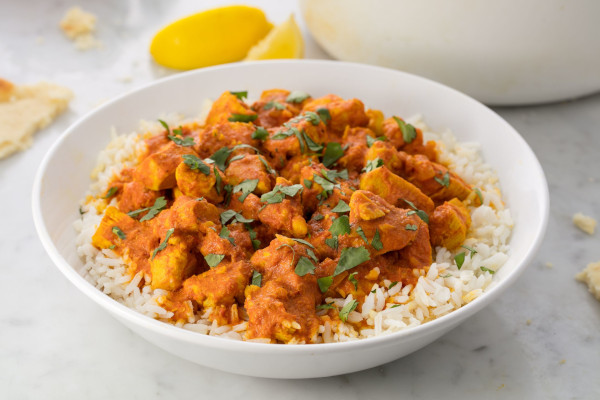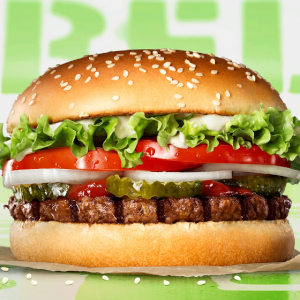The social media networks have been humming with claims that the isolate-at-home lock down has triggered food cravings in some folks – cravings that are downright odd. Those who haven’t experienced such ‘needs’ dismiss the stories are bunk. But new science says that may not be the case…
 Spicy Chicken Curry: Just as valid a craving as a Fast Food Burger
Spicy Chicken Curry: Just as valid a craving as a Fast Food Burger
(see photo, top of page) or a whole bag of OREOs.
It’s about ‘what makes you feel better’.
A current poll on Delish.com indicates that 70 percent of its readers who answered the survey question agree – they’ve experienced weird cravings while in lock down mode. That’s a lot.
What are folks ‘jonesing’ for?
Just about anything you can think of. The author of a Delish post on the phenomenon reports craving Russian Dressing, S’Mores Pop Tarts and Salmon Roe. Friends of his reported craving weird Chip flavours, and Sloppy Joes for breakfast. And I thought my recently-acquired habit of rolling supper leftovers in to breakfast Burritos was an inspiration.
Wait.
I’ve just re-read that post and it seems I’m actually as susceptible to crazy lock down cravings as the next food lover. I just hadn’t realized it until now. Even though I’d already been planning to indulge in a Chicken Lo Mein Burrito for breakfast this very morning. Oh, the irony…
It’s all in your mind
More than one theorist has, in the past, postulated that cravings are triggered by a shortage of some key nutrient – or something your body has developed an addiction to; a somatic response that tells your brain to put all else aside until the imbalance is set right.
The idea is that, if your body isn’t getting the daily dose of Sugar, Fat or Salt it expects, it will tell your brain to make you want something that will provide a jolt of what’ll do ya right.
It’s like the theory that cats and dogs eat grass when their diet isn’t providing some key vitamin or mineral their systems require to work properly. Our dog has never eaten grass. Our skinny grey cat (as opposed to the fat orange one) does eat grass regularly. But I swear he only does that so he can come back into the house and throw it up on the living room floor. That’s a comment on what we’re feeding him, I’m guessing.
Our furry companions are right. The deficiency theory, as elegant and convenient as it is, has largely been debunked. Cravings are now generally agreed to be governed by brain chemistry, not body chemistry.
A case in point
In what could qualify as a creepy an inter-species crossover story, a cat in Australia became a neighbourhood celebrity of sorts when it began to hang out at a suburban McDonald’s begging for McFood. Dubbed Frankie by the staff, he got in the habit of eating only McDonald’s food. Customers got in the habit of giving him leftovers from their take-out meals and staff gave him regular doses of the stuff that they threw out after it had seat under the heat lamps too long. Some customers even ordered extra stuff specifically to feed to the panhandling feline.
When Frankie started to look a little ragged around the edges, a resto staffer ‘rescued’ him and took him home. She was surprised at first that he wouldn’t eat regular cat food or even regular human food scraps. All he’d eat was McFood. In fact, he screamed bloody murder and got all twitchy-like when he didn’t get a regular supply of it. She finally concluded Frankie was classically addicted to McDonald’s products and was experiencing extreme withdrawl symptoms.
Frankie finally conquered his demons and got straight and healthy again, but it was a gob-smacking lesson for everyone involved in Frankie’s rehab. If you think his experience was unique to cats, I refer you to documentary film maker Morgan Spurlock’s 2004 mini-feature, Super Size Me, in which he documented his own physical deterioration and addictive habituation after just one month of eating McFood every day.
Nevertheless…
Current science says cravings are the result of addictive patterns in our brain chemistry. We are ‘hard-wired’ to want Sugar, Fat and Salt in as much as they can all trigger the release of brain chemicals called dopamines that make us feel good at the most fundamental level of our psyches. The mechanism is the same one as that which makes us want more of certain drugs, or alcohol, or caffeine or nicotine, once we’ve tried them a first time. We don’t necessarily like the sources of those chemicals (take Coffee, for instance) but we crave them nonetheless.
Stress a key
Legitimate scientific theories about cravings also cite stress as a trigger for cravings. And here is an angle that we can appreciate, having been cooped up at home for weeks waiting for the COIVD-19 curve to start trending consistently downward.
When we’re stressed out – as we all have been to some extent with COVID Cabin Fever – we crave the things that make our brains feel better. And it’s not just Fat, Salt and Sugar. It might be Spices; perhaps a specific spicy dish that represents to us the ultimate pleasant spicy experience. Or it might be something as mundane but specific as OREOs.
Cravings experts such as Dr. Kent Berridge, of the University of Michigan Department of Psychology, agree: “We have a good idea of how brain craving circuitry works to power the intensity of cravings,” Berridge told Delish, “but not so good an understanding of what controls the specific target of a focused craving, though that’s an issue that my lab does now study.”
Berridge also notes that the stress brought on by isolation, financial pressures and other nasty realities associated with he whole COVID-19 experience would rank as major triggers for cravings.
My take
I can clearly see how food cravings would serve as a means for our minds to get us to consume more of the substances that make us ‘feel better’ about our place in a disrupted, unfamiliar, perhaps even threatening world. That accepted, I can endorse indulgence in our COVID-19 cravings as a medicinal, even humanitarian undertaking – in moderation. Of course, some alert readers will cite the late, great Julia Child who famously said, “All things in moderation – including moderation .”
Just remember, next time you step onto the bathroom scale: she said that, not me…
~ Maggie J.

